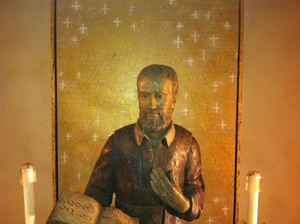 Father, you continually raise up your faithful to the glory of holiness. In your love kindle in us the fire of the Holy Spirit who so filled the heart of Philip Neri.
Father, you continually raise up your faithful to the glory of holiness. In your love kindle in us the fire of the Holy Spirit who so filled the heart of Philip Neri.
In so many ways Saint Philip Neri is a saint, a witness to the work of the Holy Spirit in this world. This fact is borne in the activity of his life for the salvation of souls. He was a close friend of the Benedictines, Dominicans, and the Jesuits. A well-sought after confessor and preacher, he drew the keen attention of Popes, bishops and saints. Who can’t relate to a man who had a keen sense of humor, a love for all people, especially the youth, and a miracle-worker. The Church has named Saint Philip one of the patrons of Rome.
My love for Philip Neri leads me to hope that Connecticut, preferably New Haven, will see an Oratory in the future.
Among other things today, I watched the 2010 film “Saint Philip Neri: I Prefer Heaven,” with Gigi Proietti, Adriano Braidotti, Francesco Salvi, and Roberto Citran. The director is the wonderful Giacomo Campiotti whom I met last fall in NYC while he was stateside promoting another film of his.
A brief biography of Saint Philip Neri.
Saint Philip Neri, one of the glories of Florence, was born of an illustrious Christian family in that city of Tuscany, in 1515. His parents lived in the fear of God and the observance of His commandments, and raised their son to be obedient and respectful. Already when he was five years old, he was called good little Philip. He lost his mother while still very young, and it seemed he should have died himself when he was about eight or nine years old. He fell, along with a horse, onto a pavement from a certain height. Though the horse landed on top of him, he was entirely uninjured. He attributed his preservation to a special intervention of God, destined to permit him to dedicate his life to the service of God.
He fled from a prospective inheritance to Rome, where he desired to study, and there undertook to tutor the two sons of a nobleman who offered him refuge. He led so edifying a life that word of it reached Florence, and his sister commented that she had never doubted he would become a great Saint. He studied philosophy and theology, and after a short time seemed to need to study no longer, so clear were the truths of God in his mind. He always kept the Summa Theologica of Saint Thomas Aquinas near him for consultation; this and the Holy Bible were his only books.
Saint Philip seemed surrounded by a celestial splendor, the effect of his angelic purity, which he never lost in spite of the many dangers that surrounded him; he came victorious from every combat, through prayer, tears and confidence in God. He often visited the hospitals to serve the sick and assist the poor. At night he would go to the cemetery of Saint Callixtus, where he prayed near the tombs of the martyrs.
He attracted a number of companions who desired to perform these devotions with him. He loved young boys most of all; he wanted to warn them against the world’s seductions and conserve their virtue in all its freshness. He would wait for them and talk to them after their classes; and many whom his examples impressed consecrated themselves to God. Assisted by his excellent confessor, he founded a Confraternity of the Most Holy Trinity for the relief of the poor, convalescents, and pilgrims who had no place of refuge. He gave lodging to many in the great jubilee year of 1550, even receiving several complete families in the houses he had obtained.
At the age of 36 he was not yet a priest, and his confessor commanded him under obedience to receive Holy Orders, which he did in the same year of 1551. He joined a society of priests and heard many confessions. Saint Ignatius of Loyola called him Philip the Bell, saying he was like a parish church bell, calling everyone to church, but remaining in his tower — this because he determined so many souls to enter into religion, without doing so himself. He himself was about to follow Saint Francis Xavier’s renowned examples, by going to India with twenty young companions, but was advised by an interior voice to consult a saintly priest. He was then told that the will of God was that he live in the city of Rome as in a desert.
The famous Society of Saint Philip, called The Oratory, began when a group of good priests joined him in giving instructions and conferences and presiding prayers; for them he drew up some rules which were soon approved. He became renowned all over Italy for the instances of bilocation which were duly verified during his lifetime. Many holy servants of God were formed in the Oratory, a society of studious priests, made ready by ten years of preparation in the common life for a service founded on sacerdotal perfection. Saint Philip died peacefully in 1595 on the Feast of Corpus Christi at the age of 80, having been ill for only one day. He bears the noble titles of Patron of Works of Youth, and Apostle of Rome.
[Source: Les Petits Bollandistes: Vies des Saints, by Msgr. Paul Guérin (Bloud et Barral: Paris, 1882), Vol. 5.]
***The image is from the Oratorians of the St Boniface Oratory, Brooklyn, NY.
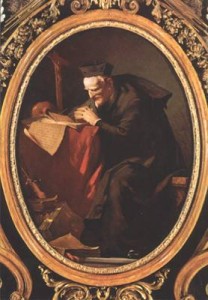 The Oratorian saints and blesseds are not well known because the Oraorian vocation is not well known in the USA. This needs to be rectified. In the USA we have several established Oratories with several more in the process of being established. Today, the priests, brothers and laity of the Oratory are honoring the Blessed Sebastian Valfre, a remarkable man of holiness and sensitivity to his neighbor. While most of his priestly ministry was in the greater Turin area, his priestly soul travelled far and wide.
The Oratorian saints and blesseds are not well known because the Oraorian vocation is not well known in the USA. This needs to be rectified. In the USA we have several established Oratories with several more in the process of being established. Today, the priests, brothers and laity of the Oratory are honoring the Blessed Sebastian Valfre, a remarkable man of holiness and sensitivity to his neighbor. While most of his priestly ministry was in the greater Turin area, his priestly soul travelled far and wide.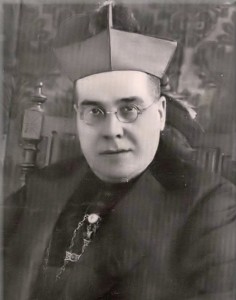
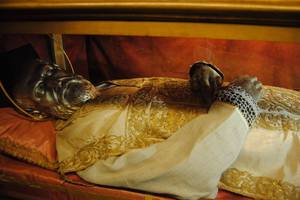
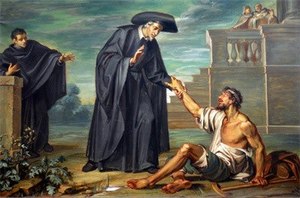

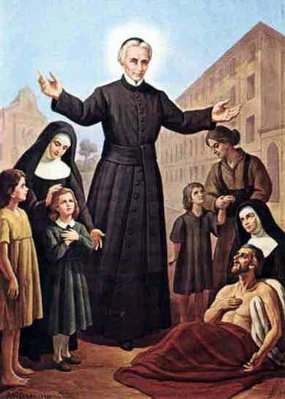

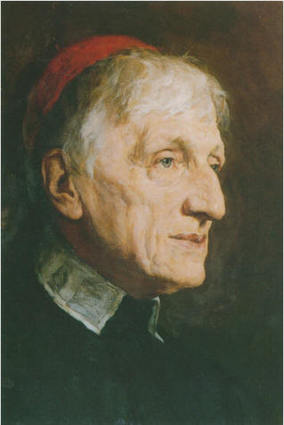
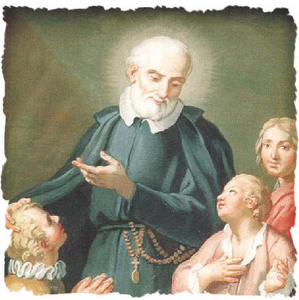 One of the epitaphs of Saint Philip Neri’s is:
One of the epitaphs of Saint Philip Neri’s is: